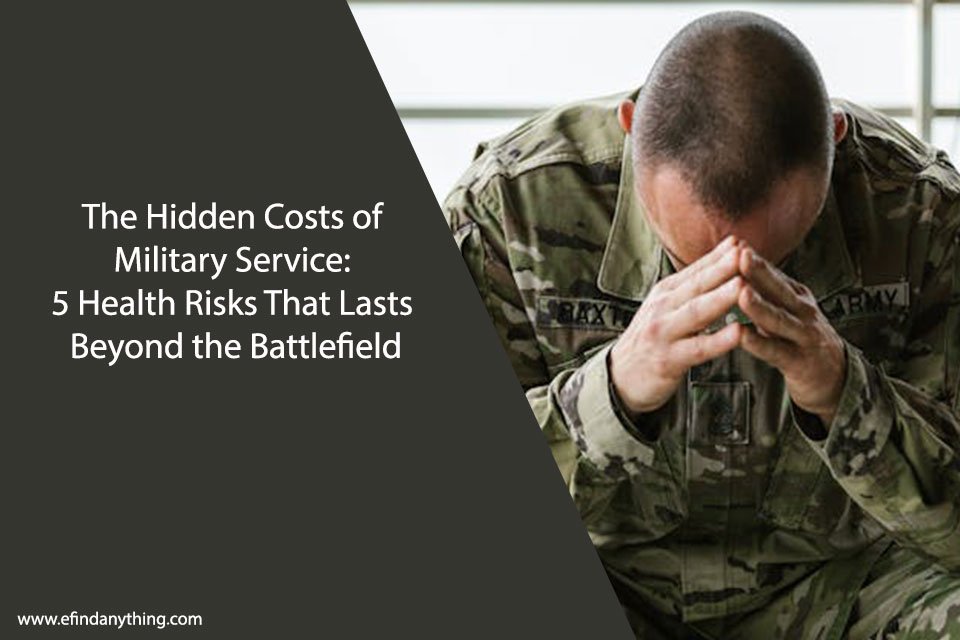
Military service is a noble calling, and it comes with a heavy price. We often focus on the immediate dangers of active combat and widely acknowledge the sacrifices made on the battlefield.
However, the hidden health risks that linger long after active duty can be equally devastating. These unseen burdens can haunt veterans for years, impacting their physical and mental well-being, relationships, and overall quality of life.
Understanding these challenges is crucial to honoring their bravery and ensuring they receive the recognition they need and deserve. This blog post delves into the five significant health risks that veterans encounter beyond their service.
Table of Contents
#1. Post-Traumatic Stress Disorder (PTSD)
The psychological toll of military service cannot be understated. Post-Traumatic Stress Disorder (PTSD) is a prevalent issue among veterans, stemming from exposure to traumatic events during combat or military operations.
According to a 2021 study by the National Center for PTSD, about 21-29% of veterans who served in the Iraq and Afghanistan wars experienced PTSD at some point in their lives. In any given year, about 14-15% of Iraq and Afghanistan war veterans are affected by PTSD. This underscores the significant impact of modern combat operations on mental health.
Symptoms such as flashbacks, sleep disorders, and hypervigilance can persist long after leaving the military. This makes it difficult for veterans to return to everyday life. The stress of combat and harsh deployment conditions also take a lasting toll. Sadly, the lack of access to mental healthcare complicates everything.
Seek professional help and build support systems as they help manage PTSD and mitigate its long-term effects.
#2. Toxic Exposure and Environmental Hazards
One of the most insidious threats to veterans’ health is exposure to toxic substances and environmental hazards. During their service, many military personnel encounter hazardous materials, such as chemicals, radiation, and burn pits.
The effects of these exposures can manifest years or even decades later, leading to serious health issues. One infamous example is Agent Orange, used in Vietnam, which has caused lasting health problems for countless veterans. Currently, the fumes from burn pits, used for waste disposal in conflict zones, pose another toxic hazard.
Even on domestic bases, there are risks. Another prime example is the Camp Lejeune water contamination disaster. According to TorHoerman Law, individuals based at the Marine Corps Base Camp Lejeune in North Carolina were exposed to toxic water between 1953 and 1987. The water was found to contain industrial solvents like trichloroethylene (TCE) and perchloroethylene (PCE), resulting in various health issues for those exposed.
After years of legal battles, the Camp Lejeune settlements provided compensation to affected veterans and their families for the harm caused by the toxic water exposure. These incidents serve as a reminder of the need for vigilance in protecting military personnel from environmental hazards.
In August 2022, the PACT Act was signed into law, expanding healthcare access and benefits for veterans exposed to toxins, including those disproportionately impacted by the Camp Lejeune water contamination. This legislation signals a crucial step in providing ongoing support for affected veterans and their families.
#3. Traumatic Brain Injuries (TBI)
TBIs are another significant health risk for military personnel. These injuries can result from explosions, combat injuries, or even training accidents.
The consequences of TBI can be far-reaching, including cognitive impairment, mood disorders, and an increased likelihood of brain-related disorders like Alzheimer’s and Parkinson’s. Early intervention and ongoing monitoring are essential for addressing TBI and mitigating its long-term effects.
Proper rehabilitation and access to specialized healthcare are vital for veterans’ recovery and long-term well-being.
#4. Musculoskeletal Injuries and Chronic Pain
The physical demands of military service can take a toll on the body, leading to musculoskeletal injuries and chronic pain. Back, knee, and joint problems are common among veterans, often resulting from the rigors of training, combat operations, and carrying heavy equipment for extended periods.
Chronic pain can drastically affect veterans’ sense of life, reducing their independence and ability to perform basic activities. Proper rehabilitation, pain management strategies, and access to quality healthcare are all crucial for alleviating these issues and improving veterans’ overall well-being.
#5. Hearing Loss and Tinnitus
The noise levels encountered during military service take a serious toll on veterans’ hearing health. Exposure to loud noises from explosions, gunfire, and heavy machinery can lead to hearing loss and tinnitus (ringing or buzzing in the ears).
Hearing loss is among veterans’ most common disabilities. According to the Veteran Affairs Annual Benefits Report for 2023, tinnitus is the top service-connected disability among veterans. It is closely followed by hearing loss, which has affected over 1.4 million veterans. Tinnitus, by contrast, has impacted about 3 million veterans.
Hearing loss can range from mild to severe, affecting veterans’ ability to communicate effectively and impacting their quality of life. Whereas, tinnitus, is another disruptive issue that results in a continual ringing or rattling in the ears. These conditions impact communication, create disorientation, and contribute to social isolation.
Even after leaving active duty, these auditory issues can persist and worsen over time. Proper hearing protection during service, regular hearing evaluations, and access to audiological care are crucial for preventing and managing hearing-related problems among veterans.
In conclusion, the sacrifices made by military personnel extend far beyond the battlefield. The hidden health costs of military service, including PTSD, toxic exposure, traumatic brain injuries, musculoskeletal issues, and hearing loss, can have lasting impacts on veterans’ lives.
Recognizing and addressing these challenges is crucial for empowering those who have served our country. Increased awareness, advocacy, and access to comprehensive healthcare resources are essential to meeting the long-term needs of veterans.
By providing mental health support, specialized medical care, and ongoing assistance, we can honor their service and ensure they receive the care and support they deserve long after their military duties end.





